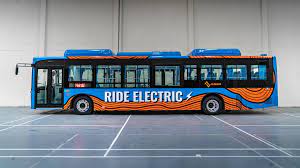The electric vehicle (EV) startup Roam, which is located in Kenya, has introduced a new shuttle bus model that it calls Move. This comes as the East African nation of Kenya continues to push for the adoption of EVs.
As a result of Kenya’s accelerated adoption of electric vehicles, against the backdrop of skyrocketing fuel prices and calls for a switch to sustainable transport options, Roam (formerly Opibus) now plans to ramp up its production of the Move bus, as well as expand its charging infrastructure, as it anticipates a growth in demand for electric buses as a result of Kenya’s acceleration of electric vehicle adoption.
Roam reported that it has received orders for a total of 50 buses, which it will begin to deliver beginning in February of the following year. The local assembly of the 42-seater buses, which have a range of 200 kilometres, employ parts purchased from China and have an estimated price tag of $135,000. The capacity of the bus can easily be increased to accommodate 52 passengers. When operating at full manufacturing capacity, it anticipates cranking out forty units each and every month.
Read also: Nigeria moves towards Green vehicle revolution
Roam, which designs and constructs its own buses, claims that the company complies with local regulations while building them, which includes having a high ground clearance.
“Building the body locally also enhances our design offering; we can move the door, build more boot space, accommodate preferred window fittings, or add air conditioning, and so on,” Roam’s country sales executive, Dennis Wakaba, reported.
The timing of Roam Move
The introduction of Roam Move follows the news that the company intends to begin manufacturing electric buses to supplement its motorbike manufacturing operations. It also follows the debut of Roam Rapid in July, which was designed to tap into Kenya’s planned (now stalled) Bus Rapid Transit (BRT) system, which was supposed to be powered by green vehicles (electric, hybrid, and biodiesel).
However, the BRT project has been put on hold. Its primary rival, BasiGo, already operates tens of electric buses on major thoroughfares in the capital city of Kenya, Nairobi.
Roam was established in 2017 by Gardler, Filip Lovstrom, and Mikael Gnge. Initially specialising in automobile modifications, the company later shifted its focus to the construction of electric vehicles.
“We started off by designing our own electric power trains back in 2018, and we have a lot of in-house expertise. We have that competence in-house that gives us more flexibility in terms of what products we can bring to the market,” said Wakaba.
Possible EVs aims to introduce electric vehicles, for a greener Nigeria
The impact of the Move bus
Roam has received funding from a Silicon Valley fund. One Ventures, Factor[e] Ventures, and Ambo Ventures, a pan-African venture capital firm, all have investors.
The launch of the Move bus comes after Kenya made further efforts to promote the usage of electric vehicles (EVs), including exempting imported and locally produced motorcycles from having to pay excise duty and rating the supply of electric buses and bicycles as exempt from rating under the present finance laws. Additionally, the nation has its own unique power (charging) tariffs.
The Electric Vehicle (EV) Charging and Battery Swapping Infrastructure Guidelines 2023 were released by Kenya’s energy authority just a week ago. These guidelines were produced in order to, among other things, expedite the construction of public charging stations, which continue to be a significant barrier to adoption.
While Kenya is laying the groundwork for the transition away from fossil fuel vehicles, the overall take-up of electric mobility in Africa is still sluggish when compared to that in the developed world. This is due to a number of challenges, including weak electricity grids, insufficient charging infrastructure, and high EV acquisition costs.




